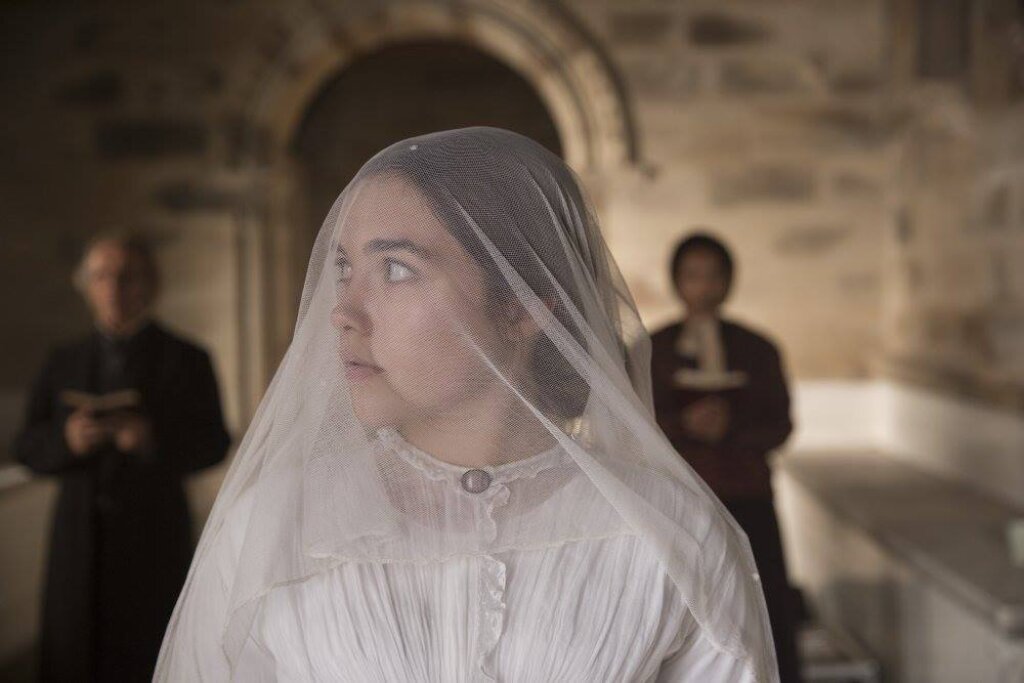James Rann is a Teaching Fellow in Russian at the University of Birmingham.
Oh great, I thought, as she suffocated the little boy, now we’re getting to my favorite bit. There really is nothing quite like Lady Macbeth of Mtsensk District for inspiring a sense of giddy complicity in homicide, especially if you’re revisiting this tale of murderous passion in provincial Russia, which has now been adapted for screen as Lady Macbeth (click here for the trailer). I hope it doesn’t reveal me as psychopath to say that each addition to the body count increases my anticipation of the final glorious scene in which the death-dealing heroine Katerina rises out of the Volga “like a mighty pike” before dragging her rival down with her into the depths.
That final scene – my favorite bit – is absent from Lady Macbeth, which transplants the action of Nikolai Leskov’s novella in place (north-eastern England) but not in time (the 1860s). But I’m not here to gripe: the venerable and vigorous genre that is finicky academic kvetching about film adaptations doesn’t need a contribution from me. What’s more, Lady Macbeth really is very good, both on its own terms and as an incarnation of Leskov’s story. But the altered final act is important, I think, because it helps us understand something essential about the book and about how we relate to characters in fiction, on the page and on the screen.
The film ends not long after the aforementioned smothering. The wily heroine Katherine dispatches the inconvenient little cherub whose claim on her murdered husband’s estate threatens the idyll she plans with her accomplice and lover Sebastian (Sergei). The curtain falls on Katherine alone – serene and apparently in the clear, having managed to shift all the blame onto Sebastian and a servant girl. It’s a kind of uneasy triumph: this simple, put-upon girl is now free of meddlesome men and is the proud owner of a beautifully lit manor house. In the original, by contrast, Katerina never looks like getting away with it, or even wanting to: instead, convicted of murder and trudging to Siberia in a prison convoy, she maintains both her lusty obsession with Sergei and her casual disregard for human life.
Getting Away with Murder
In an interview following the premiere, Lady Macbeth’s screenwriter Alice Birch explained the rationale behind the new ending. The first, eminently practical reason was that the film’s slender budget did not run to wintry crowd scenes on a rain-swollen river. Fair enough. The second reason, which seems more interesting and more dubious, was that she did not want Katherine “to be punished” but rather hoped to give her the nuanced, open ending that a character of her complexity deserves..
For one thing, I don’t think Leskov’s ending is so cut-and-dried. Sure, we’re told that Katerina does not re-emerge from beneath the waves but, as soap opera fans will tell you, unless you see the body all bets are off. I can easily see Katerina turning up in a sequel with “amnesia” and a dangerously intense crush on a local farmhand, just as I’m confident Chapaev made it safely to the other bank. Second, Katerina is not punished. She is not a drug-addled Anna Karenina slipping her neck under a train wheel because she thinks her boyfriend doesn’t love her anymore; she is a killer fish mercilessly annihilating her enemies (because she thinks her boyfriend doesn’t love her anymore). The finale is an animalistic apotheosis, not a Jezebel’s comeuppance.
Most importantly, however, I don’t think Katerina is complex. She’s a great character, but not a complex one. In my experience, Leskov’s Lady Macbeth is popular among both students and teachers of Russian literature precisely because it serves as a refreshing palate-cleanser between heavy helpings of psychological novels full of introspection and indecision. So you’ve killed an old lady with an axe, Katerina would say, good for you, now shut up about it. Leskov’s story works so well because we are only very occasionally allowed to see the world through Katerina’s eyes. Instead, he gives the whole story a fairy-tale feel in which interiority is subordinate to plot; Katerina’s motivation does not seem much more complex than that of the big bad wolf.
That’s too schematic, perhaps. Leskov hints at other reasons for Katerina’s adultery and murder other than a certain wolfish hunger. He skillfully establishes the stifling boredom of the house to which she is confined after marrying an older man. (Boredom is of course one of the most powerful forces in Russian literature: what’s nice about the distinctly unintellectual Katerina is that her response to tedium is a bit of flirting, not pamphlet-reading and discussions about deforestation.) The film captures well this gilded-cage oppression. In fact, it perhaps overdoes the book’s opposition between inside and outside. (Anyone familiar with either Russians’ aversion to open windows or the English enthusiasm for them will know that in Russia inside is somehow more inside). Leskov sets up a third space between inside and outside – the garden, the bounteous location of the lovers’ first Edenic couplings. Writer Birch and director William Oldroyd overlook the opportunities this setting offers, preferring to contrast the house with the wildness of the surrounding moors where Katerina longs to roam. This seems like a nod to English Romanticism and to Wuthering Heights, and particularly to Andrea Arnold’s 2011 film version which, like Lady Macbeth, also challenges preconceptions about race in the period.
Not only does Katherine have less breathing space than Katerina, her treatment at the hands of the men in her life is more explicitly cruel. In the novel, her husband is distant, controlling and likely impotent and her father-in-law decrepit and nosy; in the film they are not only creepy, but vicious, dealing out humiliations and beatings. One could justifiably argue that the filmmakers are merely articulating the everyday violence that was too normal to even be mentioned by Leskov, but this also seems like a conscious attempt to provide Katerina with a motive for her own turn to violence – striking back is her only way out of that hellhole.
This context compounds the effect of the foreshortened ending. In the novel, the fact that Katerina continues to yearn for Sergei – and to kill for Sergei – even when they are both prisoners makes it clear that what drives her is not the need to escape or, as the film also implies, to manoeuvre herself into a position of wealth and independence, but rather her obsessive desire. This certainly makes her less complex – in the film version we are left to wonder whether Katherine might just have been using Sebastian – but it doesn’t dilute her power or her potential as a figure for positive identification. I’m not saying that Leskov’s story can’t be read as particularly well written example of patriarchal slut-shaming, but Katerina is open to different interpretations: she could be seen as a male nightmare of the destructive power of female sexuality or, alternatively, as a frank and empowering acknowledgment of the same. She is less like her scheming, guilt-ridden Shakespearean namesake than a homespun Russian Medea.
This ambivalence may sound like complexity, but it is not. It is precisely the lack of psychological layering in the novel that allows for open-endedness. The Katerina of the book has a mythic quality which the film’s Katherine does not share. In part, this is a product of the changing medium: films show us actual human beings with faces and historically accurate crinolines, grounding them in a specific situation. But lots of novels aspire to this connection with real experience too. Ironically, then, it is Leskov’s decision to reject precise setting and psychology that makes Katerina such a resonant character and, ultimately, makes the novel such fertile ground for musical and cinematic adaptations which then strive to fill in the blanks.
Complexity Be Damned!
People normally complain that big-screen retellings make things too simple; now here I am saying that this film is too complex and novelistic. But I don’t mean to complain: Katherine is an intriguing character in a subtle film. My problem is with the assumption that complexity is synonymous with quality. Partly this is a result of reading too many essays claiming that “X is interesting because it is interesting, which is interesting.” But students aren’t to blame: this is a tendency that’s inherent to academia. In his pithily titled takedown of over-refinement in sociology, ‘Fuck Nuance’, Kieran Healy points out how theories inevitably become weighted down with exceptions, conditionals and “yes, buts” partly because it is easy and rewarding to show yourself to be a more subtle reader than those other charlatans that call themselves scholars. In literary studies this is not just about showing off, it’s often the only way you can make a living: everyone’s read the same books, so if you want to prove your worth, you have to read them better, finding and mining untapped reserves of complexity.
This isn’t going to change, of course, and it’s hardly the concern of filmmakers. But I do think it is important for those who interpret Russian culture for a non-Russian audience to make the case for simplicity, to demonstrate not just Russia’s depth, but its breadth, to draw attention to its potboilers as well as its headscratchers. This may seem a strange thing to ask for at a time when uninformed commentators are churning out simplistic “insight” into Russia in industrial quantities. But Kremlinology and other brands of bullshit are often predicated on the presumption of a particular kind of complexity – the notion that Russia is an inscrutable land of soul-searching profundity and Machiavellian strategy that requires expert unpicking. While that can be true, it’s not always true. And this is where Katerina comes in, with her lack of ulterior motives and her straightforward enthusiasm for freedom, sex and premeditated homicide. I’m not saying Katerina represents Russia, but that she could serve as a figurehead for that overlooked section of Russian culture that’s not about psychology, philosophy or three-dimensional chess, but about strong characters, lurid action and weird dreams about cats. The Russians love their children too, Sting said; sure, and sometimes they just have to kill the pesky little brats as well. Simple as that.





